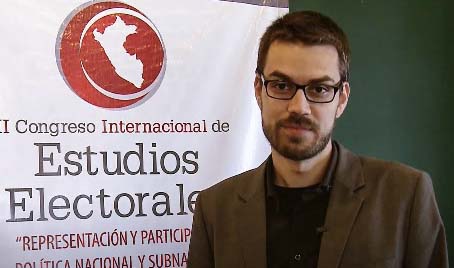Nuevos artículos publicados por el investigador Tomas Dosek
Tres nuevos artículos publicados por el investigador CISEPA Tomas Dosek ya se encuentran disponibles. El artículo "Case Selection, Levels of Analysis, and Scope Conditions", ha sido publicado en el journal Studies in Comparative International Development (2020), y pueden acceder a este mediante una suscripción a dicha plataforma.Abstract: Subnational research in comparative politics has been growing steadily in the last two decades. However, methodological advances have been rather limited. This article builds upon Snyder’s (Stud Comp Int Dev 36(1):93–110, 2001) subnational comparative method and extends its logic to the comparison of subnational units from different countries. It proposes a novel typology of multilevel research designs that focuses particularly on cross-national small-N analysis (CSNA). This research design offers three different logics of qualitative case selection to achieve a sound trade-off between internal and external validity. This article analyzes the advantages and limitations of the underlying logics of CSNA and illustrates their use with recent empirical research from Latin American countries. It concludes by highlighting its versatility and offers a series of best practices in order to produce more generalizable findings than the majority of single-country subnational comparisons.
Publicado junto a la también investigadora CISEPA, Maritza Paredes, el artículo "The Subnational Indigenous Quota in Peru: The Paradoxes of Political Representation", ha sido publicado en el Volumen 62, Special Issue 3, del journal Latin American Politics and Society, y pueden acceder al documento en pdf desde la misma página.Abstract: The objective of this article is to explain the territorial variation in indigenous political representation at the subnational level in Peru. The Peruvian state introduced a weak indigenous electoral quota, and its effects have varied across provinces. This article presents a typology that combines descriptive and substantive dimensions of political representation. Using a subnational comparative method, the four cases studied illustrate distinct dynamics. The article argues that these differing dynamics are explained by a combination of sociostructural variables (i.e., political articulation and cohesion of indigenous organizations as a result of a conflict) and individual variables (i.e., candidates’ political capital). This article demonstrates how, even in an institutionally adverse environment that does not feature ethnic parties, both descriptive and substantive indigenous political representation can be achieved, and that these two dimensions are not necessarily related. The article is based on fieldwork and interviews with key provincial political actors.
Por último, "Conflict or Cooperation? Political Relations between Governors and Mayors in Major Cities in Argentina", ha sido publicado por el Bulletin of Latin American Research, journal de la Society for Latin American Studies (SLAS), junto al investigador Carlos Varetto, de la UNSAM de Argentina.Abstract: This article explores the nature of the relations between the governors and the mayors of major cities in Argentina. The vast majority of the literature assumes that municipal governments in Argentina are weak, and that mayors therefore align with the provincial authorities. This study argues that there is more diversity in the relations between officials of both levels, and that, in some cases, these relations are openly contentious. Four ideal types of relations are identified, based on political affiliation and type of relation, through the systematisation of 43 cases of major Argentine cities.

